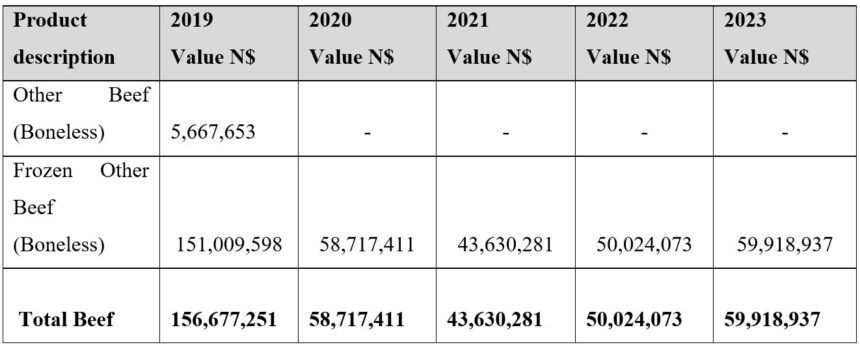Namibian beef exports to China have experienced significant growth, hitting the N$60 million per annum mark.
This is according to the latest data shared by the trade ministry. It underscores the deepening trade relationship between Namibia and China.
“Namibian beef exports increased to over N$59.92 million in 2023, up from N$50.02 million in 2022. This increase of N$9.89 million reflects a strong year-on-year growth rate of 19.8%, highlighting the sustained demand for high-quality Namibian beef in China,” stated ministry spokesperson Elijah Mukubonda. He added that the positive trend of increasing beef exports demonstrates a clear alignment with the growing Chinese market’s preferences.
President Nangolo Mbumba announced at the recent China-Africa forum that Namibia also increased its export of mutton and dried fruit to China.
Mukubonda noted that the current trade protocol between Namibia and China permits only the export of beef.
“However, negotiations between the two governments have been ongoing, which culminated in the signing of the Protocol on Inspection, Quarantine and Hygiene Requirements for mutton and chevon to be exported from Namibia to China in September 2024.
This new protocol will allow for the export of bone-in goat and mutton as well as frozen or chilled deboned or bone-in caprine or ovine skeletal muscle,” he elaborated.
The increased exports present new domestic opportunities to further diversify export markets and increase small-stock production, particularly in communal areas, to benefit women and youth.
This would further enhance the excellent bilateral relations of the two nations.
He emphasised that trade relations with China diversify Namibia’s export markets, thereby reducing reliance on traditional markets in the European Union and Southern African Development Community (SADC). It will also stabilise domestic export revenue flows.
“Namibia offers a wide range of sectors in trade and investment, including tourism, agriculture, energy, infrastructure, agribusiness, housing, transport and logistics. Our focus in China is to enhance tourism, trade and investment opportunities, and facilitate market access for Namibian goods and services,” the spokesperson reiterated. Mukubonda added that China has become Africa’s largest trading partner, providing African countries access to a vast market for their goods.
“This partnership was further strengthened at the recent Forum on China-Africa Cooperation Summit (FOCAC), where China announced expanded duty-free access for African goods to its market, paving the way for African countries to export a more diversified range of products to China,” he noted.
Strengthening Namibia-China cooperation within the broader framework of SADC will enhance regional integration and tie in well with the “Partnership Action for Connectivity”, which is part of the action pact that president Xi Jinping emphasised during the 2024 FOCAC Summit.



